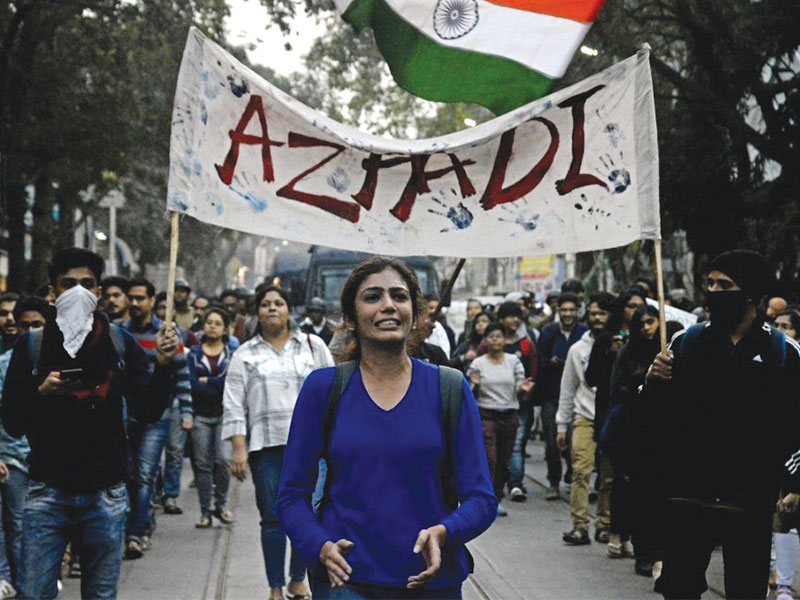
Although university students in Delhi have been the focus of media attention for mass protests against the Citizenship (Amendment) Act (CAA) and the proposed National Register of Citizens (NRC), West Bengal and Kolkata in particular have also witnessed huge public protests with thousands of students and members of the major political parties — the Trinamool Congress, Congress and Left and communist parties — taking to the streets through December to voice their disapproval of “black laws”.
The anger of Kolkata’s students is real and palpable. On December 24, Debsmita Chowdhury, a gold medallist student of Presidency University’s international relations school, tore up a copy of the controversial Citizenship (Amendment) Act while receiving her degree at the annual convocation ceremony held on the campus.
Earlier in the day, Jagdeep Dhankar, governor of West Bengal and ex officio chancellor of Presidency University (PU), who arrived on the university’s campus to preside over the annual convocation ceremony, was forced to leave after students en bloc refused to accept degrees from him and PU’s staff/employees’ association blocked his entourage. Dhankar’s public statements in support of CAA have prompted students of several other universities to threaten boycott of their convocations if Dhankar — ex officio chancellor of all public universities in West Bengal (pop. 91 million) — graced the ceremony. Five universities including Burdwan, Calcutta, Presidency, Jadavpur and Maulana Abul Kalam Azad University (Makaut) have postponed their convocations because of the massive agitations in West Bengal.
Unsurprisingly, a war of words has broken out between Dhankar — representative of the BJP/NDA government at the Centre — and spokespersons of the state’s TMC government. Reacting to Dhankar’s statement that the public and students protests in West Bengal are orchestrated by opposition parties and TMC to create “policy paralysis” in the state and that the “strategy to compromise the position of chancellor is unfortunate and counter-productive,” education minister Partha Chatterjee said: “The chancellor is expected to be a neutral constitutional head of the government of West Bengal. But he is more interested in executive decision-making than discharging his duties as a constitutional head.”
Ever since assuming charge on July 30, 2019, the governor has been at loggerheads with the Mamata Banerjee government over several issues — from seating arrangements at the Durga Puja carnival to arrangements for his security. On September 19, he rushed to Jadavpur University to ‘rescue’ Union minister Babul Supriyo, who had been gheraoed by some students. On his way back to Raj Bhavan with the minister, the agitating students blocked his car at the varsity gate for several hours.
Most academics in Kolkata are of the opinion that Dhankar– a veteran BJP leader and Supreme Court lawyer who represented the party in the Rajasthan legislative assembly (1993-98) and Lok Sabha (1989-91) — has been transcending the boundaries of propriety as chancellor of West Bengal’s public universities by encroaching on their autonomy. Not few believe his brief is to create chaos and unrest in West Bengal in the run-up to the state assembly elections scheduled for 2021.
Meanwhile, with the legislative elections only a year away, chief minister Mamata Banerjee is pulling out all stops to woo West Bengal’s electorate and consolidate her support base. After creating history and routing the CPM (Communist Party of India-Marxist)-led Left Front government that (mis)-ruled West Bengal uninterruptedly for 34 years (1977-2011), in her second term Banerjee has tried to woo the disgruntled Bengali middle class by belatedly bringing about the promised poribartan (change) in the education sector.
In the past one year, a slew of initiatives has been taken by the TMC government in the school and higher education space. Among them, ensuring regular attendance of teachers in the state’s 92,000 government schools, opposing the no-detention provision of the RTE Act (s.16) and announcement of the promotion of one private and seven state-aided universities as also two government-aided undergrad colleges. In other pro-middle class reforms, the Kolkata Municipal Corporation has converted four of its 350 primary schools to English-medium.
With anti-CAA and NRC protests spreading like wildfire and the BJP having failed to retain power in Maharashtra, Haryana, Madhya Pradesh, Rajasthan, Chhattisgarh, and most recently in Jharkhand, the chances of Banerjee and the TMC being returned to Writers Building, Kolkata for an unprecedented third term have brightened considerably. Especially, with West Bengal’s Left students unions beginning to view TMC as the lesser evil.
Baishali Mukherjee (Kolkata)























